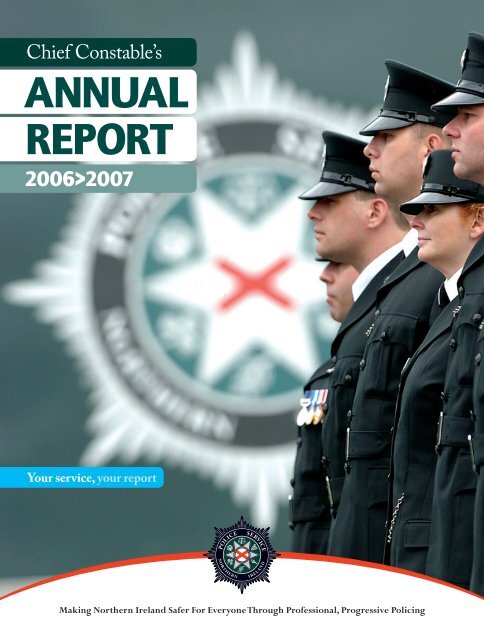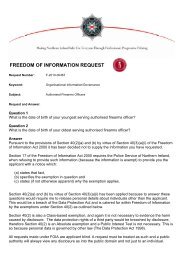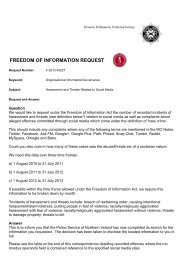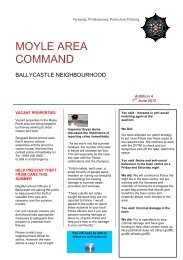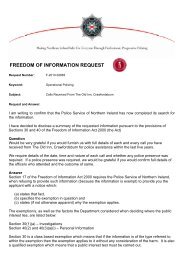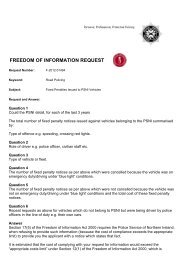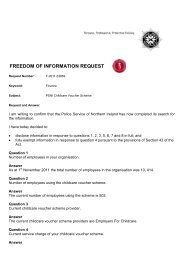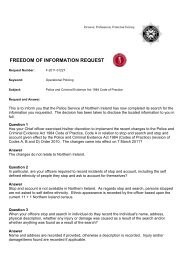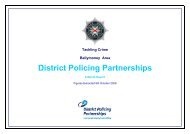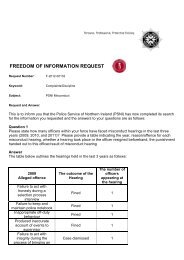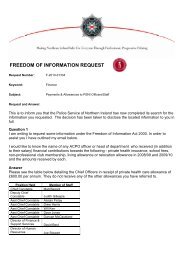Chief Constable's Annual Report 2006-07 - Police Service of ...
Chief Constable's Annual Report 2006-07 - Police Service of ...
Chief Constable's Annual Report 2006-07 - Police Service of ...
Create successful ePaper yourself
Turn your PDF publications into a flip-book with our unique Google optimized e-Paper software.
<strong>Chief</strong> Constable’sANNUALREPORT<strong>2006</strong>>20<strong>07</strong>Your service, your report
<strong>Chief</strong> Constable’s ForewordBUILDINGSAFERCOMMUNITIESEvery day in policing is different. Each brings its ownchallenges and opportunities while many have their rewardsand some their difficulties.This report is an opportunity to reflect onhow we as a pr<strong>of</strong>essional and effective <strong>Police</strong><strong>Service</strong> work through all <strong>of</strong> those challenges,opportunities, rewards and difficulties to builda safer community for everyone.The year under review in this report willstand out long into the future as a particularlysignificant one, not just for the <strong>Police</strong> <strong>Service</strong>but also for the people it serves. Policingonce again found itself at the centre <strong>of</strong> majorchange and the focus <strong>of</strong> much communityand political debate.For the first time, all <strong>of</strong> our major politicalparties declared support for policing and thecriminal justice system. I have always saidthat policing is a public service, which everymember <strong>of</strong> the public should feel free to accesswithout fear or other obstacles. I am proud <strong>of</strong>the work and commitment <strong>of</strong> my <strong>of</strong>ficers andstaff who have helped create the conditionswhich made this year’s progress possible.Once again, this annual report is being sent toevery single household in Northern Ireland aspart <strong>of</strong> our ongoing engagementwith people and our commitmentto openness and transparency. Itseeks to give you a broad picture<strong>of</strong> what police are doing on yourbehalf, and why.Overall crime continues to fall and is downby almost two per cent. This puts the crimerate at a five year low. We achieve resultsthrough constantly updating police methodsand techniques and through the essentialsupport we receive across the community.The engagement and conversations we arehaving at all levels are crucial if we are tocontinue to achieve reductions in the number<strong>of</strong> burglaries, thefts, fraud, vehicle crime androbbery throughout all areas.Detectives and civilian specialists attached toCrime Operations fearlessly tackle the seriousand organised criminals. Their successes areoutlined in the report but one in particular– Northern Ireland’s biggest ever seizure<strong>of</strong> drugs, £18 million worth <strong>of</strong> cannabis inNewtownards – is worthy <strong>of</strong> mention here.Despite these successes, some people still havea very real fear <strong>of</strong> crime. <strong>Police</strong> on the groundare tackling that through initiatives such asthe growing number <strong>of</strong> neighbourhood watchschemes and crime prevention advice.We continue to try to make our roads safer.Six fewer people died last year. But we arefar from complacent. Road safety is a majorpolicing priority and I remain very concernedabout the numbers killed and seriously injuredon our roads. As a <strong>Police</strong> <strong>Service</strong> we cannotdismiss the importance <strong>of</strong> both education and2chief constable’s<strong>Annual</strong> report <strong>2006</strong>><strong>07</strong>Deliveringimprovementspeople can seeengineering, which sit alongside enforcement.We will continue to target the drink/drugsdriver, the speeder, those who do not wearseatbelts and those who drive without carethrough education and enforcement.The past is an ever-present element <strong>of</strong> policinghere. It is important that we deal with iteffectively and sensitively if we are to achievea better future. We will do our part whileothers need to explore the need for a widerand more comprehensive approach to dealingwith this complicated and difficult territory.In order to meet our commitment to thepublic enquiries established by Government,we set up Crime Support Department headedby a new Assistant <strong>Chief</strong> Constable. ThisDepartment will be the interface betweenthe <strong>Service</strong> and the Rosemary Nelson, BillyWright and Robert Hamill inquiries. It willalso be responsible for re-examining unsolvedmurders committed between April 1998and the establishment <strong>of</strong> Crime OperationsDepartment in March 2004. The HistoricalEnquiries Team (HET) continues to reexamineall deaths attributableto the security situation between1969 and 1998.As a <strong>Service</strong>, we work closelywith the <strong>of</strong>fice <strong>of</strong> the <strong>Police</strong>Ombudsman. During the yearshe published a report into the RaymondMcCord Junior murder case and we acceptedall <strong>of</strong> the report’s recommendations, many <strong>of</strong>which had already been implemented.The year under review saw planning for majorstructural change in the <strong>Service</strong> which went‘live’ on 1st April 20<strong>07</strong>. Eight new DistrictCommand Units were set up to replace theexisting 29 districts. The aim is to deliverimprovements to policing that peoplecan see on the ground. The new structuregives us more capability and enhanceseffectiveness and efficient resource use. Thenew commanders are committed to constantlyimproving delivery at the front line andengaging at the local level where it matters.We still face challenges in the time ahead.Like other public bodies, the future raisesthe prospect <strong>of</strong> reduced budget and therequirement to do more with less. We believethat we are up to the task.By working with local communities toidentify local issues and, most importantly,local solutions we can and will continue todeliver a safer Northern Ireland.Sir Hugh Orde<strong>Chief</strong> ConstableIN THE SPOTLIGHTPolicing was at the heart <strong>of</strong> significantpolitical, community and socialdevelopments during the year. As aresult, media focus was intense at local,national and international levels.The Department <strong>of</strong> Media and Public Relationsis the prism through which that interestis reflected both internally and externally.Headed by Director Sinéad McSweeney,the Department exists to support policingin its many facets through three branches– News, Public Relations and Public Affairs.While significant effort was directed intoexplaining the major issues <strong>of</strong> developmentand change facing the <strong>Service</strong>, equal effortwas devoted to supporting front line policingthrough engagement with local and nationalmedia and key stakeholders.NEWSMore than 16,000 calls were receivedfrom media outlets over the past twelvemonths. Some 1,600 interview facilitieswere arranged for <strong>of</strong>ficers at all ranks – fromConstable to <strong>Chief</strong> Constable – and thebranch dealt with local media and mediaorganisations throughout the world includingTime Magazine, USA Today, CanadianBroadcasting Network as well as journalistsfrom French, German, Swiss and Japanesemedia outlets.The story <strong>of</strong> policing in Northern Irelandcontinued to be one that made the headlinesright across the globe. Officers have carriedout interviews explaining the role <strong>of</strong> the<strong>Police</strong> <strong>Service</strong> <strong>of</strong> Northern Ireland anddemonstrating <strong>of</strong>ten first hand through ‘ridealongs’for journalists the proactive work theydo to make Northern Ireland safer for all.Over the past twelve months the Departmentalso issued thousands <strong>of</strong> appeals forinformation through the media. These havemade a real difference in terms <strong>of</strong> solvingcrimes here and in reassuring the public.Community Notification Orders werereleased using the media regarding three sex<strong>of</strong>fenders who had failed to comply with theirobligations. Within a short period <strong>of</strong> havingreleased these details to the media, informationwas received quickly which allowed police topinpoint the location <strong>of</strong> the <strong>of</strong>fenders.PUBLIC RELATIONS<strong>2006</strong> saw the development <strong>of</strong> a newdedicated Public Relations branch withinthe Department. Staffed by public relationspr<strong>of</strong>essionals, the team works in partnershipwith police <strong>of</strong>ficers and staff to developCameras focus on the launch <strong>of</strong> the WinterAnti-drink Drive Campaign. An actor playsthe ‘drink driver’.communication strategies that supportthe work <strong>of</strong> the <strong>Service</strong>.Communications strategies have beendeveloped to support major projects, whichinclude the CORE project, which is the<strong>Service</strong>’s response to the Review <strong>of</strong> PublicAdministration, through to the recent yearlongknife crime campaign which saw theintroduction <strong>of</strong> a number <strong>of</strong> knife amnestiesacross Northern Ireland.The Public Relations team also managed therole <strong>of</strong> the <strong>Police</strong> <strong>Service</strong> in the recent Policingthe Future event, an international policingconference hosted by the <strong>Police</strong> <strong>Service</strong> andthe Northern Ireland Policing Board. Withspeakers such as Bill Bratton, <strong>Chief</strong> <strong>of</strong><strong>Police</strong> for Los Angeles and Sir Ian Blair,Commissioner for the Metropolitan <strong>Police</strong>,the conference attracted a wide range <strong>of</strong>delegates and saw policing and communityrepresentatives share their experiences anddebate the future <strong>of</strong> policing across a number<strong>of</strong> areas.Targeting thieves at Christmas, the team furtherdeveloped a successful seasonal campaign to alertthe public to keep their property and presentssafe. This campaign ran across NorthernIreland with specially designed messages forposter sites, adshels and shopping centres.The Public Relations team also managed the<strong>2006</strong> Policing with the Community Awards.One <strong>of</strong> the highlights <strong>of</strong> the policing calendar,the ceremony rewards <strong>of</strong>ficers and staff forgoing that extra mile and is attended byover 300 guests.With responsibility for corporate internalcommunications, <strong>2006</strong> saw the development<strong>of</strong> a new communications tool designed toreach all employees <strong>of</strong> the <strong>Police</strong> <strong>Service</strong>.CallSign Online, a fortnightly onlinenewsletter, brings the latest news directlyto <strong>of</strong>ficers and staff. It complements thestaff magazine, CallSign, which keeps staffinformed <strong>of</strong> events and shares best practice.PUBLIC AFFAIRSThe societal changes which have impactedon the structure and development <strong>of</strong> policinghas made it all the more important for the<strong>Service</strong> to engage with individuals <strong>of</strong> influenceand stakeholders in the community. ThePublic Affairs branch has played a key role inmonitoring, assessing and reporting on suchdevelopments - keeping the organisationinformed <strong>of</strong> the constantly changingenvironment in which it operates.The Public Affairs branch has also workedto facilitate effective communication betweenthe <strong>Service</strong> and its many stakeholders.
TAKING ON THE CRIMINALSORGANISEDCRIMEOne particularly difficult area tocombat has been extortion – victims areunderstandably reluctant to come forward.A telephone helpline was set up in May<strong>2006</strong> for members <strong>of</strong> the public who are,or may be, the victims <strong>of</strong> extortion.<strong>Police</strong> are providing victims with an initialeasy point <strong>of</strong> contact where advice andassistance are available. Calls to the helpline(028) 909 222 67 were slow to start but anadvertising campaign in the constructionsector and a pilot mail shot to businesses inPortadown and Craigavon have the potentialto increase awareness and the number <strong>of</strong> calls.The Drug Squad continued its policy <strong>of</strong>disrupting the supply <strong>of</strong> drugs at the top level,making seizures and bringing charges as wellas playing an active role in reducing demandthrough the NI Alcohol and Drugs Strategy.Operational highlights included the largest everSCIENTIFICSUPPORTThe importance <strong>of</strong> scientific supportto crime investigations cannot beoverestimated.The Fingerprint Bureau has introduceda number <strong>of</strong> new technological advances– the Livescan system has been installedin custody suites, allowing detainees tobe positively identified while they are stillin detention and the AFIS (AutomaticFingerprint Identification System) iscurrently being upgraded to give PSNI one<strong>of</strong> the most advanced systems in the world.Here are some positive outcomes:●●●In February 20<strong>07</strong> when a house wasburgled and a number <strong>of</strong> items stolen,fingerprints were recovered and identifiedwithin 24 hours and a suspect arrested.As a result the property taken in theburglary was recovered and returnedto the householder.A Crime Scene Investigator recovereda sample <strong>of</strong> saliva at a murder scenewhich identified a suspect who wassubsequently charged.A CSI recovered a small sample <strong>of</strong> bloodfrom criminal damage to a motor vehiclewhich led to 36 crimes being clearedand generated more intelligence whichled to seven further arrests and another46 clearances.4chief constable’s<strong>Annual</strong> report <strong>2006</strong>><strong>07</strong>Headed by Assistant <strong>Chief</strong> Constable Peter Sheridan, CrimeOperations Department is responsible for conducting allinvestigations into organised crime, serious crime, includingmurders, and terrorism. Its teams <strong>of</strong> detectives work within-house specialists, including police (crime) analysts, todeliver effective investigations and manage intelligencefor the protection <strong>of</strong> the community.drugs seizure in Northern Ireland –three and a half tonnes <strong>of</strong> cannabis worth£18 million in Newtownards in October<strong>2006</strong> – as well as the seizure <strong>of</strong> £300,000worth <strong>of</strong> cocaine on the M2 in March20<strong>07</strong>. Charges were brought against anumber <strong>of</strong> individuals in both operations.Hitting criminals where it hurts – in theirpockets – has also been a priority. The <strong>Police</strong><strong>Service</strong> signed an agreement with the AssetsRecovery Agency in August <strong>2006</strong> to train250 financial investigators from across theUK to follow a money trail from individualswith a lifestyle beyond their legitimate meansback to its criminal source, at whatever level.<strong>Police</strong> <strong>of</strong>ficers and members <strong>of</strong> other lawenforcement and government agencies inNorthern Ireland and Great Britain receivetraining in how to detect money laundering,carry out detailed financial investigationsand work on confiscation processes.During the year the Economic CrimeBureau made 78 cash seizures totalling£567,184, obtained 26 restraint orders worth£10.4 million and secured 12 confiscationorders amounting to £1.4million.INTELLIGENCEDuring the year the <strong>Police</strong> Ombudsmanpublished a report into the RaymondMcCord Junior murder case. The <strong>Police</strong><strong>Service</strong> has accepted the Ombudsman’srecommendations.Significant re-organisation and new systemsand processes, which have been put in placeover the last five years to deal with this mostdifficult area <strong>of</strong> policing, will ensure thatthe situation described by the Ombudsmancould never happen again.Like any other police service in England,Scotland, Wales or the Republic <strong>of</strong> Ireland,the <strong>Police</strong> <strong>Service</strong> <strong>of</strong> Northern Irelandcannot operate effectively, it cannotfulfil its primary function to prevent anddetect crime, unless it uses intelligence.The use <strong>of</strong> properly managed sources can<strong>of</strong>fer significant access to the thinkingand planning <strong>of</strong> criminals and criminalorganisations.Intelligence used by police <strong>of</strong>ficers has savedlives, resulted in arrests and charges and ledto the recovery <strong>of</strong> drugs, weapons and illegalmaterials.Sources are not above the law. Individualswho operate outside their authorisationwill be liable to arrest and prosecution inthe same way as any other person whobreaks the law. This is clearly reflected in<strong>Police</strong> <strong>Service</strong> policy and procedures inrelation to the use <strong>of</strong> sources.PSNI has an absolute commitment that thegathering and use <strong>of</strong> intelligence must be forDet. Supt. Hayden Bell, head <strong>of</strong> Drug Squad,shows security minister Paul Goggins part <strong>of</strong>the £18m cannabis haul.And for the first time in Northern Ireland, sixdogs were trained to sniff out cash as part <strong>of</strong>the <strong>of</strong>fensive against criminals. The dogs wereused in planned search operations as well as topatrol airports and harbours. <strong>Police</strong> can retaina percentage <strong>of</strong> any confiscated money and thisis ploughed back into the fight against crime.During the past year police have worked inpartnership with the Serious Organised CrimeAgency on a number <strong>of</strong> investigations includinginternational probes into drug smuggling,people trafficking and counterfeiting.the protection and vindication <strong>of</strong> the humanrights <strong>of</strong> all. This commitment is underpinnedby legislation and substantial regulation,including the European Convention onHuman Rights and the Regulation <strong>of</strong>Investigatory Powers Act 2000.Responsibility for national security willtransfer from the <strong>Police</strong> <strong>Service</strong> to MI5 laterthis year. PSNI Intelligence Branch continuesto work closely with the Security <strong>Service</strong> toenable the transfer to take place smoothlyand effectively.Five principles have been agreed to ensurethat there is no diminution <strong>of</strong> the PSNI’sability to fight crime and that accountabilitymechanisms remain in place.ANALYSISThe innovative work <strong>of</strong> analysts continuesto support front line policing by assistingpolice teams in identifying policingproblems, understanding the possiblereasons why these problems occur andproviding some solutions.● In <strong>2006</strong>, analytical support in Districtshelped provide a more focussed approachtowards key problems such as Halloween.Analysts looked at what had happenedpreviously and identified key issues. Thisenabled many Districts to develop earlyaction plans including media campaigns andpartnership work. The impact <strong>of</strong> this forwardplanning assisted in a 10% reduction inviolent crime over Halloween comparedto the previous year and a 3% reductionin overall crime.SERIOUSCRIMEDuring <strong>2006</strong>, Serious Crime Branchinvestigated 23 murders (down from25 the previous year) and was able toclear 17 <strong>of</strong> these cases which resultedin a clearance rate <strong>of</strong> 73.9%.The Computer Crime Unit used pioneerings<strong>of</strong>tware programs and investigativetechniques to catch a pornographer inOctober <strong>2006</strong> when the team carried outinvestigations into indecent conduct by asuspect who was using instant messagingon a home computer. Examination <strong>of</strong> thesuspect’s computer revealed a variety <strong>of</strong>other <strong>of</strong>fences, including possession, makingand distribution <strong>of</strong> child pornography.These <strong>of</strong>fences were discovered bytrawling instant messaging services forevidence and liaison with other UK<strong>Police</strong> E-Crime units. This individual wasfound guilty and is awaiting sentence.Legal history was made in March 20<strong>07</strong>in a high pr<strong>of</strong>ile terrorist related murderinvestigation carried out by <strong>of</strong>ficers fromSerious Crime Branch. At the end <strong>of</strong> theprosecution case during the original triallast year, the judge dismissed the caseafter a defence application. <strong>Police</strong> madelawyers aware <strong>of</strong> new legislation and theprosecution, on taking this advice, appealedthe ruling at the Court <strong>of</strong> Appeal. A newtrial took place in 20<strong>07</strong> and the accusedentered a plea <strong>of</strong> guilty to manslaughterand was sentenced to eight years’ jail.As part <strong>of</strong> a commitment to continuousimprovement, the Serious Crime ReviewTeam conducts reviews into all unsolvedcurrent murder investigations after28 days. The <strong>Service</strong> has committedsignificant dedicated resources to thisand the current team is one <strong>of</strong> thebiggest dedicated units in the UK.Four unsolved murder reviews werecompleted during the period and a fifth wasinitiated. In addition, a considerable amount<strong>of</strong> work was carried out on almost 100 olderunsolved cases, a number <strong>of</strong> which have beenpassed to detectives for further investigationand, hopefully, successful outcomes.● Analysts continue to provide supportin tackling persistent and priority <strong>of</strong>fenders– those individuals committing large volumes<strong>of</strong> crime across Northern Ireland. A newUnit, the Persistent Offenders Linked CrimeAnalysis (POLinCA) Unit was establishedto maximise the use <strong>of</strong> forensic, intelligenceand crime information. The successfulpr<strong>of</strong>iling <strong>of</strong> key <strong>of</strong>fenders has already helpedto arrest and charge serial <strong>of</strong>fenders and toclear up many crimes.● Significant assistance is provided to‘complex’ serious and organised crime cases– working in support <strong>of</strong> partner agencies <strong>of</strong>the Organised Crime Task Force (OCTF).Innovative work to focus efforts against keycriminal gangs has supported effective policeaction against drugs, smuggling and moneylaundering.
SUPPORTING THE FRONT LINEThe Department <strong>of</strong>Operational Support isled by Assistant <strong>Chief</strong>Constable Roy TonerANPR: DENYINGCRIMINALSTHE ROADSAutomated Number Plate Recognition(ANPR) systems are used widely by UKpolice to identify vehicle registrationdetails via mobile or static cameras andto provide alerts on vehicles involved ineither serious crime or more minor traffic<strong>of</strong>fences.Thus ANPR assists the <strong>Police</strong> <strong>Service</strong> toimprove policing service to the communitythrough crime detection and prevention.During <strong>2006</strong>/<strong>07</strong>, 75 ANPR mobile unitswere deployed across Northern Ireland withadditional expansion planned for 20<strong>07</strong>/08.Further strategic plans are being finalisedto establish a corporate ANPR serviceemploying both mobile and static camerasduring 20<strong>07</strong>/08.ANPR services assist police to improveroad safety, to increase crime detection,and to effectively deny criminals use <strong>of</strong>the public roads.VIPER: REPLACINGTHE ‘LINE-UP’A Video Identification Parade ElectronicRecording (VIPER) system was introducedto replace what most people wouldrecognise as the ‘identification parade’.It uses a national database <strong>of</strong> images, toreplace the traditional real people line-up.A DVD identity parade is produced includingthe suspect along with members <strong>of</strong> the publicdrawn from the database. The Video IDParade can be viewed by the victim or witness,at a convenient location such as a policeviewing facility, hospital or even in theirown homes.The VIPER system <strong>of</strong>fers more accurateidentification <strong>of</strong> suspects, quicker and moreconvenient establishment <strong>of</strong> ID parades,reduction in witness stress, reduction in overallprocess costs, and a fairer system for bothvictim and suspect.The VIPER system is now NorthernIreland-wide, with seven suites situatedat Omagh, Strand Road (Londonderry),Coleraine, Lisburn, Musgrave Street (Belfast),Antrim and Newry, all providing enhancedoperational efficiency to policing process.<strong>Chief</strong> Superintendent Ricky Russell helpsto launch the ‘Attention Card’.Crime SupportDepartment isheaded by Assistant<strong>Chief</strong> ConstableAlistair FinlayPUBLIC INQUIRIES:THE ROLE OFCRIME SUPPORTCrime Support is a new departmentwhich was set up during the year. It isheaded by Assistant <strong>Chief</strong> ConstableAlistair Finlay, who was appointed inAugust from Strathclyde police, wherehe had 24 years’ service.The Department is the <strong>Police</strong> <strong>Service</strong>’smain interface with the three publicinquiries in Northern Ireland – theRosemary Nelson, Robert Hamill andBilly Wright inquiries – through itsPublic Inquiry Branch.It also provides that interface betweenthe <strong>Service</strong> and two public inquiries in theRepublic. They are the Smithwick inquiryinto suggestions that members <strong>of</strong> AnGarda Síochána, or other members <strong>of</strong> theIrish state, colluded in the murder <strong>of</strong> RUC<strong>of</strong>ficers <strong>Chief</strong> Superintendent Harry Breenand Superintendent Robert Buchanan in1989, and the McEntee inquiry whichis examining the Dublin and Monaghanbombings <strong>of</strong> 1974.LIVESCANELECTRONICFINGERPRINTINGLIVESCAN provides real-time electroniccapture and immediate automatedchecking <strong>of</strong> suspects’ fingerprints andpalm prints during custody detention,replacing heret<strong>of</strong>ore traditional andlaborious ink and paper captures.Rollout <strong>of</strong> the new service during <strong>2006</strong>/<strong>07</strong>to all custody suites has enhancedoperational policing through real timeidentification <strong>of</strong> detainees and early notice<strong>of</strong> outstanding warrants/warnings againstindividuals. In excess <strong>of</strong> 2000 printsper month are currently processed andadditional enhancements to AutomatedIdentification capability are planned tocontinue during 20<strong>07</strong>/08 to provide PSNIwith a world class service.A suspect’s fingerprint is scanned.POLICING THROUGHPARTNERSHIPIn July <strong>2006</strong>, Operational Policy andSupport Branch began working inpartnership with Autism (NI) to pilot aproject on the development and use <strong>of</strong>an ‘Attention Card’ to assist in situationsinvolving contact between individuals withAutistic Spectrum Disorders (ASDs) andpolice <strong>of</strong>ficers.Autism is a disability that disrupts thedevelopment <strong>of</strong> social and communicationskills. It had become clear that there is littleknowledge and understanding <strong>of</strong> ASDsamongst criminal justice pr<strong>of</strong>essionals generally,and very little recognition <strong>of</strong> the range <strong>of</strong>difficulties that cause particular problems forpeople with ASD when they come into contactwith police, whether as a victim or perpetrator<strong>of</strong> a crime.A successful application to the Policing withthe Community Fund provided the fundingrequired for the project, and the support <strong>of</strong> theNorthern Ireland Ambulance <strong>Service</strong> (NIAS)and the Northern Ireland Fire and Rescue<strong>Service</strong> (NIFRS) ensured that an ‘Emergency<strong>Service</strong>s’ approach was secured.The ‘Attention Card’ is the size <strong>of</strong> a credit card,and bears the logos <strong>of</strong> the <strong>Police</strong> <strong>Service</strong> <strong>of</strong>Northern Ireland, Autism (NI), NIFRS andNIAS. It was decided that cardholder detailswould be kept on a confidential databaseadministered by Autism (NI), and each cardwould be individually numbered to avoidmisuse. Only young people and adults whohave a formal diagnosis <strong>of</strong> an ASD will beissued with the card. The card displays adviceon how to deal with a person with an ASD, plusdetails <strong>of</strong> someone to contact in an emergency.The Branch approached <strong>Chief</strong> Supt RickyRussell, the police commander in Foyle, whoembraced the initiative, and with the valuableassistance from his <strong>of</strong>ficers, the pilot project was<strong>of</strong>ficially launched at the Guildhall, in Derry,on 23rd March 20<strong>07</strong>.FIREARMS ANDEXPLOSIVESFirearms and Explosives Branch administersa licensing and control function on behalf<strong>of</strong> the <strong>Chief</strong> Constable as required by law.There were, at 31 March 20<strong>07</strong>, some 66,800Firearm Certificate holders in NorthernIreland who possessed 136,930 firearms forsporting or other legitimate purposes. Thisrepresents a significant reduction over thepast two years.The branch also has responsibility foroverseeing the safe use <strong>of</strong> explosives andsupervised some 1,600 blasting operationsthroughout Northern Ireland during <strong>2006</strong>,the vast majority <strong>of</strong> which were at quarries.A second branch within the Departmentis known as the Retrospective MurderReview Unit (RMRU). The Departmentis based at Seapark, on the outskirts <strong>of</strong>Belfast where works have been carried outto upgrade existing accommodation. ThePublic Inquiry Branch has three units:● the Public Inquiry Unit (PIU)● the Legal Unit● the Redaction and Intelligence Unit.The PIU is responsible for meeting the<strong>Police</strong> <strong>Service</strong>’s legal obligations to provideinformation and other material to thepublic inquiries. This involves a substantialundertaking to search for archive materialwithin the organisation. The four-strongLegal Unit is responsible for providinglegal support to serving and former <strong>of</strong>ficersinvolved in the inquiries.The Retrospective Murder Review Unitis responsible for the re-examination <strong>of</strong>unsolved murders that were committedbetween the signing <strong>of</strong> the Good FridayAgreement, on 10th April, 1998 andthe setting up <strong>of</strong> Crime OperationsDepartment 1st March 2004.ACC Finlay is a native <strong>of</strong> Scotland.He joined the police in 1982, beginninghis service in the south side <strong>of</strong> Glasgow.He was appointed <strong>Chief</strong> Superintendentin <strong>2006</strong> and took responsibility for theForce Inspectorate before coming toNorthern Ireland.chief constable’s<strong>Annual</strong> report <strong>2006</strong>><strong>07</strong>5
POLICING WITH THE COMMUNITYBALLYMENA HEROINDEALERS DISRUPTED6Policing with the community is what we do. It is what we do best. It is delivered through twooperational police regions. They are Urban region – which is essentially Belfast and its immediateenvirons – and Rural region, the rest <strong>of</strong> Northern Ireland. Assistant <strong>Chief</strong> Constable DuncanMcCausland is responsible for Urban region while Assistant <strong>Chief</strong> Constable Judith Gillespie is incharge <strong>of</strong> Rural region. It would be impossible to detail all <strong>of</strong> the exciting, original and effectivepolicing initiatives that take place thoughout a year. Here is a snapshot.Operation Surge – an intelligence-led policeoperation – started a year <strong>of</strong> activities designedto disrupt the supply <strong>of</strong> heroin. As a directresult, thirteen people were arrested andcharged with supplying drugs.The issue <strong>of</strong> drugs in Ballymena Districthas been the subject <strong>of</strong> much discussion for anumber <strong>of</strong> years. This year local police have hadconsiderable success in tackling the problem.Building on the success <strong>of</strong> Operation Surge,police continued to target drug dealers. Afurther 80 house searches were carried out andas a result <strong>of</strong> this focussed activity the quantities<strong>of</strong> heroin, cocaine, Ecstasy and cannabis seizedhave increased.LISBURN’S K-JET PROJECTThe K-JET programme came to life whenit was discovered, by <strong>of</strong>ficers from the NorthLisburn Community Policing Team, that somechildren in a local housing development, whowere coming to their attention, also had thecommon factor <strong>of</strong> having Attention Deficit /Hyperactive Disorder (AD/HD) diagnosed.AD/HD is a disability which affects the waysome children or young people communicateand relate to the world around them. Therewere no support groups in place in Lisburnso the Community <strong>Police</strong> set up a scheme,in partnership with Lisburn YMCA, LNCA(Lisburn North Community Association)and NI-ADD (Northern Ireland AttentionDeficit Disorder) Support Centre, to divertthese children from anti-social behaviour. Theevaluations were very positive with a notablereduction (23 per cent) in anti social behaviourwithin the targeted housing estate. Thatreduction now stands at 57 per cent.BALLYMONEY TACKLESYOUTH ISSUESA police project in Ballymoney in Decemberto involve young people aged between 14 and23 has seen a significant reduction in <strong>of</strong>fences.The ‘Street Intervention’ scheme involved policeengaging with a group <strong>of</strong> young people few <strong>of</strong>whom got involved in traditional youth clubsor sporting activities.chief constable’s<strong>Annual</strong> report <strong>2006</strong>><strong>07</strong>An evaluation <strong>of</strong> the project showed that inthe Castle Street, Seymour Drive and Westgatearea <strong>of</strong> the town between December 06 andFebruary <strong>07</strong> there was a reduction <strong>of</strong> 29 percent in criminal damage compared to theprevious year.BRAVERY IN ARMAGHThree <strong>of</strong>ficers received Royal Humane Societyawards for bravery shown in rescuing an elderlyman from a house in Milford area, <strong>of</strong> Armagh,after an explosion. They were Sergeant KennethMillen and Constables Michael Cunninghamand John Connolly. On November 22, the<strong>of</strong>ficers responded to a call to a gas explosion.The buildings were in danger <strong>of</strong> collapse.Other residents said that an elderly man wastrapped in the house. Sgt Millen and ConstableCunningham went inside closely followed byConstable Connolly who had only stoppedto get the first aid kit. Gas still appeared tobe leaking. The <strong>of</strong>ficers located the man in abedroom and carried him to safety.HALLOWE’EN SPECIALIN CRAIGAVONAnti-social behaviour and increased crimein Craigavon around the Hallowe’en periodwas targeted through a partnership approachbetween police, the local Community SafetyPartnership, schools and the local press.Secondary school students were invited to anevent where they heard from police <strong>of</strong>ficers, theRoyal Society for the Prevention <strong>of</strong> Accidents anda consultant from the Accident and Emergencydepartment at Craigavon Area Hospital.Proactive mobile and beat patrols by policeidentified hotspots and a mobile police stationwas used during a Council-organised fireworksdisplay. Officers seized illegal fireworks. Bothreported crime and injuries reduced.EDUCATION INEAST BELFASTCommunity tension was reduced in a number<strong>of</strong> areas <strong>of</strong> East Belfast through a series<strong>of</strong> education and awareness days stronglysupported by police community safety andyouth diversion <strong>of</strong>ficers.The initiative arose out <strong>of</strong> what seemed to bean initial problem <strong>of</strong> ‘youths causing annoyance.’However, research showed that in additionthere was an intolerance <strong>of</strong> young people bysome elderly people; potential race hate crimesagainst recently arrived foreign national workersand a wish by those workers to be understoodby the existing community.VIOLENT CRIME DOWNIN DOWNViolent crime fell by 18 per cent in Newcastleduring July and August following a communitybased campaign to tackle drink related issues.Criminal damage fell by five per cent.While the initiative concentrated on theNewcastle area, it also operated across DownDistrict. It was in response to the significantincrease in the population during the holidayperiod and involved police, the District Counciland its enforcement <strong>of</strong>ficers and the drinks trade.A poster campaign in bars and <strong>of</strong>f-licenceswas backed by high visibility police targeting<strong>of</strong> hot spot times and locations. Community<strong>of</strong>ficers also used bicycle patrolling to raise thecampaign pr<strong>of</strong>ile.DRUG DEALERSTHWARTED IN LIMAVADYA major focus <strong>of</strong> police in Limavady was acontinued effort to thwart people responsiblefor illegal drugs and the trade in counterfeitand contraband goods.These are issues which were identified asconcern to local people through the DistrictPolicing Partnership. A number <strong>of</strong> searcheswere carried out between September andNovember which resulted cannabis, Ecstasytablets and a substantial haul <strong>of</strong> cocaine, worth£140,000, being seized.<strong>Police</strong> believe that a main drug network inthe district was disrupted through a majoroperation in March during which twelve houseswere searched and a number <strong>of</strong> arrests made.PROACTIVE IN FOYLE<strong>Police</strong> in Foyle had a successful year, launchinga number <strong>of</strong> proactive protocols and strategies.These included a protocol to tackle racist crime.<strong>Police</strong> and partner agencies are at an advancedstage in setting up a multi-cultural forum. Astrategy for children and young people was alsodeveloped after considerable research carriedout by Derry District Policing Partnership andthe University <strong>of</strong> Ulster. An advisory groupconsisting <strong>of</strong> 26 young people has been set upas one <strong>of</strong> four pilot schemes in Northern Ireland.The District’s inter-agency domestic violencepolicy goes from strength to strength and wasrecommended as a template <strong>of</strong> good practice ina report on human rights commissioned by thePolicing Board. Foyle has achieved a 29% reductionin domestic violence crimes with 200 fewerreported incidents on the same period last year.ASBO OFFICER INNEWTOWNABBEYNewtownabbey has its own Anti-SocialBehaviour panel which meets regularly toplan how the problem is tackled. A speciallydedicated police <strong>of</strong>ficer oversees all applicationsto the courts in relation to Anti-SocialBehaviour Orders (ASBOs).The <strong>of</strong>ficer also provides a single point <strong>of</strong>contact for all other partners involved. TheASB panel includes the police along withrepresentatives from the Housing Executiveand Newtownabbey Borough Council.YOUNG DRIVERSIN MOYLEThree special ‘cruise’ events for youngdrivers played a key role in the drive totackle anti-social motoring in Moyle District.The events were organised by local policein conjunction with specialist Road Policing<strong>of</strong>ficers and Ballymena and Moyle DistrictPolicing Partnerships. The cruise events wereheld in local car parks late in the evening whenreports were being received about anti-socialmotoring. It enabled <strong>of</strong>ficers to deliver somevery hard-hitting road safety messages.ON THE BUSES INMAGHERAFELTPolicing with the community was taken directto the people <strong>of</strong> Magherafelt district... on theback <strong>of</strong> a bus. A series <strong>of</strong> bus posters usedwidely across the area was part <strong>of</strong> a generalcampaign to raise awareness <strong>of</strong> the servicesprovided by community beat team <strong>of</strong>ficers. Ittied in details <strong>of</strong> the local Community SafetyPartnership’s ‘Safer Magherafelt’ website. Thishad been significantly re-branded to informlocal people that community safety is a leadingpriority for the police, the Partnership and thelocal council.BREAKING BARRIERSIN COOKSTOWN<strong>Police</strong> in Cookstown faced up to the challenge<strong>of</strong> an influx <strong>of</strong> families from across the EuropeanUnion and beyond with, amongst otherinitiatives, the production <strong>of</strong> an informationleaflet in a number <strong>of</strong> languages. The leaflethighlighted four main areas: road safety,child protection, domestic violence and noisepollution. In addition to an English version forthe indigenous resident population, the leafletwas translated into the main language groups <strong>of</strong>incoming workers – Latvian, Lithuanian, Polish,Portuguese, Russian and Slovakian.ON THE WALLS INWEST BELFAST<strong>Police</strong> within West Belfast wished to identify amethod <strong>of</strong> communicating some simplistic crimeprevention messages to the local community.In an area where it has been historicallydifficult to engage with some elements withinthe community, it was decided to utilise thelarge perimeter walls <strong>of</strong> Grosvenor Road, NewBarnsley and Woodbourne police stations todisplay high pr<strong>of</strong>ile and visible banners carryingcommunity safety messages. The CrimePrevention messages chosen were very specificto the District and had three themes: vehiclecrime, burglary and drug dealing.
PEOPLE: OUR IMPORTANT RESOURCEDirector <strong>of</strong> HumanResources Joe StewartANNUALPERFORMANCEREVIEWThe revised APR system for police <strong>of</strong>ficerscame into effect on 2nd April 20<strong>07</strong>.The APR project team has workedcollaboratively with the <strong>Police</strong> College todevelop a training solution to meet the needs<strong>of</strong> the 7, 500 <strong>of</strong>ficers to whom the revisedpolicy applies in a timely and appropriatefashion. The prospect <strong>of</strong> extracting <strong>of</strong>ficersfor training on such a large scale within thegiven timescales was immense. A blendedlearningapproach was introduced to meetthe training demand.Training support for <strong>of</strong>ficers will be providedthrough a number <strong>of</strong> streams includinge-learning modules available on the APRand <strong>Police</strong> College website. This e-learninginitiative, which is the first <strong>of</strong> it’s typein the <strong>Service</strong>, moves training from theclassroom to the anytime... anywhere. Itsflexibility addresses the needs <strong>of</strong> a 24/7policing organisation by allowing individual<strong>of</strong>ficers choice and freedom over where andwhen within the workplace they completethe training modules. Officers can learnaccording to their schedule, not the schedule<strong>of</strong> the training department.FIT FOR ROLE...FIT FOR LIFEWorking to improve the health and wellbeing <strong>of</strong> police and staff, OccupationalHealth and Welfare (OHW) has continuedto develop initiatives and programmes tomanage the impact <strong>of</strong> health issues onthe delivery <strong>of</strong> front line policing.The health screening programme knownas “Health Patrol” has continued to deliverlifestyle advice in local stations. The work <strong>of</strong>which has been greatly enhanced with theLINKING WITHDISTRICT POLICINGPARTNERSHIPSA two day pilot session for the new<strong>Police</strong> Management Scenario (PMS)training programme for District PolicingPartnership Members and their localpolice command teams was held in the<strong>Service</strong>’s Simulated Learning ‘HydraMinerva’ Suite in Antrim.The first course involved twelve membersfrom Craigavon District Policing Partnershipworking in teams alongside local their localpolice managers, led by their new DisttrictCommander, <strong>Chief</strong> Superintendent AlanTodd. This complied with recommendation148 <strong>of</strong> the Patten <strong>Report</strong> which requiredopening up <strong>of</strong> police training to externalgroups.The course focused closely on the key issuessponsorship <strong>of</strong> a new mobile clinic vehicleby the <strong>Police</strong> Federation. The programmehas been extended to include regular healthsurveillance for specialist groups focussed onmaintaining fitness for role. This is supportedby rehabilitation programmes to assist <strong>of</strong>ficersand staff recover after illness or injury usingspecialist advice and personalised interventions.The physiotherapy scheme provided treatmentto over one thousand <strong>of</strong>ficers and staff sufferingfrom musculoskeletal problems speeding theirreturn to work or in some cases preventing theneed for sick leave.OHW is looking at ways to deliver theiridentified in separate Training Needs Analysesconducted on behalf <strong>of</strong> the Policing Boardand aimed to:1. Enable DPP members / communityrepresentatives to gain an appreciation<strong>of</strong> the complexities <strong>of</strong> police managementand decision making.2. Enable police <strong>of</strong>ficers to engage moreopenly with community representativesin relation to policing issues.3. Allow both parties to experience real life‘Collaborative Problem Solving’ in relationto live issues from their own areas inreal time.The format <strong>of</strong> the course involved delegatesworking ‘in role’ as police managers allocatingresources and managing responses for anevening / night shift within a fictional town.By using the ‘Immersive Learning’ facilitiesat Steeple, participants had the opportunityto engage with each other’s roles and justifydecisions made during subsequent plenarydiscussion sessions.services within each <strong>of</strong> the new districts toencourage collaborative work on improvingattendance through enhanced casemanagement approaches. Counselling andother support interventions have continued tobe reviewed. The in-house employee assistanceprogramme for face-to-face counselling isnow supported by an out <strong>of</strong> hour’s telephonecounselling service.The range <strong>of</strong> services provided continues tobe reviewed to support the drive to have more<strong>of</strong>ficers available and fit for front line policeduties by empowering <strong>of</strong>ficers and staff tomaintain their health and fitness throughouttheir career.GOLD STANDARDIN I.T. TRAININGThe Information and CommunicationTechnology Training Unit (ICTTU)was successful for the fourth year inachieving ‘Gold’ status in the IT industrystandard for training.This is awarded by the Institute <strong>of</strong>Information and Technology Training(IITT) which promotes the industrystandard for IT training within the UnitedKingdom. ICTTU at Garnerville, Goughand Maydown are also among the UKleaders in adopting the innovative ‘TAP’methodology in training delivery.Over 50% <strong>of</strong> the UK’s police services useTAP methodology . Nine <strong>of</strong> the top ten lawfirms use TAP and ICTTU are one <strong>of</strong> onlytwenty organisations who are allowed to useand promote on their literature, the ‘QueensAward’ emblem.EQUALITY ANDDIVERSITYThe past year has been exceptionally busyand productive in the area <strong>of</strong> equality anddiversity within <strong>Service</strong>.As part <strong>of</strong> the police contribution toAnti-Racism in the Workplace Week, inNovember, the <strong>Service</strong> hosted a conferenceentitled ‘Dealing with Racism in NorthernIreland’ which considered recent reportsfrom the Institute for Conflict Research andthe Northern Ireland Council for EthnicMinorities.Four Equality Impact Assessments have beencarried out in the past twelve months. Thesefocussed on the areas <strong>of</strong> Youth Diversion,Protection <strong>of</strong> Children and Vulnerable Adults,Recruitment and the Promotions processeswithin the <strong>Service</strong>.These can be viewed on the <strong>Police</strong> <strong>Service</strong>website www.psni.police.uk.There has been considerable policy developmentwith a new equal opportunities policy, grievancepolicy and bullying/harassment policy. Thesehave been supplemented by an innovativeapproach to training using the mediationservices <strong>of</strong> the Labour Relations Agency.Important work continues around the issues<strong>of</strong> managing pregnant workers and childcare.Significant funding was secured from theNorthern Ireland Office to appoint a dedicatedChildcare Coordinator for the next three years.This person will manage, co-ordinate andpromote not only a Childcare Voucher Schemewithin <strong>Police</strong> <strong>Service</strong> but employee access tolocal day-care and after school care servicesthroughout Northern Ireland.A draft Disability Action Plan 20<strong>07</strong>-2010 hasbeen published. It seeks to promote positiveattitudes <strong>of</strong> people with disabilities and alsoto encourage their greater participation inpublic life.A number <strong>of</strong> diversity training packages(role plays, e-learning etc) have been designedand there has been a fundamental redesign <strong>of</strong>diversity training for recruits. It uses communityexperts to come into the training environmentand deliver training on sectarianism, lesbian,gay, bi-sexual and trans-gender issues andrace matters.In addition to specific diversity training, almost6,000 police <strong>of</strong>ficers and staff have receivedequal opportunities training during <strong>2006</strong>.During <strong>2006</strong>, the EMPA (Ethnic Minority<strong>Police</strong> Association), GPA (Gay <strong>Police</strong>Association) have hosted events and a fledging<strong>Police</strong> <strong>Service</strong> ‘Women’s Network’ wascommenced at a meeting <strong>of</strong> the Association<strong>of</strong> Women <strong>Chief</strong> Officers hosted in BelfastCity Hall, in November, <strong>2006</strong>.chief constable’s<strong>Annual</strong> report <strong>2006</strong>><strong>07</strong>7
DELIVERING ON SAFETYCriminal JusticeDepartment is headedby Assistant <strong>Chief</strong>Constable Drew HarrisCitizen and SafetyEducation (CASE)programme£4,000 recieved from investigations went to ChildLine. ACCDrew Harris; Policing Board Chairman Sir Desmond Rea and DCIAlister Wallace present the cheque to ChildLine’s Karen Walker.PUBLICPROTECTIONOfficers within Criminal Justice Departmenthave worked closely over the last yearwith staff from a broad range <strong>of</strong> Agenciesconnected to the Criminal Justice System.Initiatives have been developed to improveprotection <strong>of</strong> vulnerable groups and thewider community in general. A furtherpriority has been the focus on volume crimeand <strong>of</strong>fender management resulting inthe implementation <strong>of</strong> new procedures toimprove detection and enhance public safety.The Education Adviser in Community SafetyBranch (CSB) arranged for staff from ChildExploitation and Online Protection (CEOP)to train over 60 schools liaison <strong>of</strong>ficers in theSchools Internet Safety package ‘Think UKnow’. The training was extremely successfuland has led to this programme now beingdelivered in schools across Northern Ireland aswell as to teachers and other external groups.Between January-March 20<strong>07</strong>, all those<strong>of</strong>ficers delivering the CASE Programme inschools received accredited Child ProtectionTraining facilitated by staff from Children InNorthern Ireland (a regional organisation forthe Children’s sector in Northern Ireland).POLICECOMMUNITYSUPPORT OFFICERSThe <strong>Police</strong> <strong>Service</strong> and the Policing Board,and backed by the Northern Ireland Officeplans to recruit 400 <strong>Police</strong> CommunitySupport Officers (PCSOs). These areuniformed civilian staff who will work insupport <strong>of</strong> frontline police <strong>of</strong>ficers.The <strong>Chief</strong> Constable and the Policing Boardhave agreed that the primary role <strong>of</strong> a PCSOshould be that <strong>of</strong> patrolling local areas,engaging with all sections <strong>of</strong> the communityto solve problems and address issues thatreally matter to people living in the area. Theintroduction <strong>of</strong> PCSOs in Northern Irelandis an essential element to the commitment<strong>of</strong> the <strong>Police</strong> <strong>Service</strong> to deliver policingwith the community. This exciting newinitiative is designed to reduce crime andenhance perceptions <strong>of</strong> safety within ourcommunities.Coleraine Inspector Andy Lemon on patrolwith Lancashire PCSO Dave Johnson whovisited the town.8chief constable’s<strong>Annual</strong> report <strong>2006</strong>><strong>07</strong>Formation <strong>of</strong>youth IAG forumA pilot youth Independent Advisory Grouphas been established across four districts andwill address the views and needs <strong>of</strong> youngpeople with regard to policing for the periodFebruary 20<strong>07</strong>-March 2008. Groups havebeen established in the Fermanagh, Down,Moyle and Armagh areas with young peoplebetween the ages <strong>of</strong> 14-18 years participating.It was launched in Cookstown by Deputy<strong>Chief</strong> Constable Paul Leighton along withDonna Treanor, from BBC Northern Irelandand ‘X-Factor’ television personality Chico.Hate IncidentPractical Action<strong>Police</strong> joined with partner agencies, theHousing Executive and the CommunitySafety Unit at the Northern Ireland Officein a scheme that provides security equipmentand advice to victims <strong>of</strong> hate crime wherethe incident occurs at or near their home.HUMAN RIGHTS:CENTRAL TOMODERN POLICINGThe <strong>Police</strong> <strong>Service</strong> performance in relation toHuman Rights is scrutinised by the HumanRights advisors to the Northern IrelandPolicing Board. Assistant <strong>Chief</strong> ConstableDrew Harris is the Human Rights Championfor the <strong>Service</strong> and is charged with promotinga human rights culture throughout theorganisation.In response to the Policing Board’s HumanRights <strong>2006</strong> <strong>Annual</strong> <strong>Report</strong>, which contained45 recommendations for improvement,Criminal Justice Department published aHuman Rights Programme <strong>of</strong> Action. Thislaid out how each recommendation in thePolicing Board’s report would be dealt with.It covered policing functions across the<strong>Service</strong> and received the co-operation <strong>of</strong> alldepartments. It has led to developments ininitial and in-service training, crime operationsand dealing with minority communities.IndependentAdvisory GroupsThese groups are an important source <strong>of</strong>advice and guidance to less representedsections <strong>of</strong> the community. <strong>Police</strong> haverecently initiated an IAG for members <strong>of</strong>the lesiban, gay, bi-sexual and transgender(LGBT) communities. They organiseda drama and discussion event duringintercultural and anti-racism weekhighlighting the difficulties faced by members<strong>of</strong> the Irish Travelling community in theirday-to-day lives. The event also enabled IrishTravellers and Travellers’ support organisationsto gain an insight into public service delivery.‘IMPACT’ OF THESOHAM MURDERSThe IMPACT Programme was establishedfollowing the Bichard inquiry into the Sohammurders to meet recommendations in SirMichael Bichard’s report concerning the needfor IT solutions to improve the managementand sharing <strong>of</strong> information and intelligence bythe police service at national and local levels.The enquiry into the murders <strong>of</strong> HollyWells and Jessica Chapman by Ian Huntleyhighlighted the need for better informationsharing at a national level. National problemsrequire national solutions, so as part <strong>of</strong> <strong>Police</strong><strong>Service</strong>’s ongoing commitment to communitysafety, it has now joined the national scheme.The IMPACT programme, which is the parent<strong>of</strong> the IMPACT Nominal Index (INI), radicallyimproves the ability to share information acrosspolice service boundaries. It enables an <strong>of</strong>ficerin one <strong>Service</strong> quickly to establish whether anyother <strong>Service</strong> holds information on a person <strong>of</strong>interest in any <strong>of</strong> their main operational systemsin the areas <strong>of</strong> crime, custody, intelligence,domestic violence, firearms and child protection.In <strong>2006</strong>, the <strong>Police</strong> <strong>Service</strong> was involved in theback recording conversion <strong>of</strong> records held in theareas <strong>of</strong> domestic violence and custody. Workhas already commenced on the back recording<strong>of</strong> custody records. The INI at present holdssome 52 million records nationally, 1.1 million<strong>of</strong> which come from PSNI databases. Thisrepresents a major advance in the protection<strong>of</strong> children and vulnerable adults, vetting,and in the investigation <strong>of</strong> serious crime.BailThe <strong>Police</strong> <strong>Service</strong> had for some time beenconcerned about the information availableregarding defendants released on bail bythe courts. A previous arrangement withNI Court <strong>Service</strong> whereby details <strong>of</strong> bailgranted and varied were faxed to policehad only limited success and a number <strong>of</strong>fundamental difficulties were identified.Working in partnership with the NICourt <strong>Service</strong>, an electronic solution wasdeveloped resulting in the delivery <strong>of</strong> timelyand accurate exchange <strong>of</strong> bail informationon a daily basis. <strong>Police</strong> computer recordsnow hold comprehensive details <strong>of</strong> all bailgranted, varied and cancelled from theprevious days business at Magistrates’,Crown and High Courts.Guidancefor OfficersOne <strong>of</strong> the challenges facing the <strong>Police</strong><strong>Service</strong> – and particular front line <strong>of</strong>ficers– is the increasing volume <strong>of</strong> new legislationbeing introduced. This year saw the majorrevision <strong>of</strong> legislation governing policepowers to stop and search, powers <strong>of</strong>entry, search and seizure, powers <strong>of</strong> arrest,detention and questioning and treatment<strong>of</strong> persons by police. The information onthe changes was conveyed to every <strong>of</strong>ficerand member <strong>of</strong> police staff in an easilyunderstood format via email. Guidance wasposted on the staff intranet and suppliedto the Training Branch for more detaileddissemination.MANAGINGVOLUME CRIMEOfficers from Criminal Justice Departmentsit on a multi-agency working group onreducing delay in the criminal justice systemand improving quality <strong>of</strong> prosecution files.As a consequence <strong>of</strong> this work, a scheme hasbeen developed whereby first time <strong>of</strong>fenderscan be referred to the Public Prosecution<strong>Service</strong>, a direction made and a Cautionor Informed Warning delivered with hours<strong>of</strong> the admission.Volume Crime Management has beenpiloted in three sites all reporting thatit improved the quality <strong>of</strong> investigation(consequently prosecution) files alsoimproved and that the quality <strong>of</strong> crime datais more accurate and supervision and generalmanagement <strong>of</strong> volume crime has improved.
THE COST OF POLICING<strong>of</strong>ficers from the commencement <strong>of</strong> the scheme.The Department <strong>of</strong>Finance and Support<strong>Service</strong>s is led byDirector David BestThe total available Main <strong>Police</strong> Grantrevenue funding for <strong>2006</strong>/<strong>07</strong> includingnon-cash was £749.4m. Total net cashrevenue expenditure for <strong>2006</strong>/<strong>07</strong>including non-cash was £743.3m, resultingin a surplus <strong>of</strong> £6.1m (0.8%) <strong>of</strong> theavailable grant. Actual capital spendwas £35.6m against available funding <strong>of</strong>£36.1m, resulting in a surplus <strong>of</strong> £0.5m.The aim is to deliver measurable benefits. Thepie charts to the right detail how the moneywas spent for main police grant revenue andcapital. The surpluses <strong>of</strong> budget over spend,reflect the continued success <strong>of</strong> devolvedbudgeting and local empowerment <strong>of</strong> DCU’sand Headquarter departments.<strong>Police</strong> Pensions spend was £149.8m, includingInjury on Duty Awards <strong>of</strong> £13.7m. This isabated by employer and employee contributions<strong>of</strong> £84.8m, resulting in a net position <strong>of</strong> £65.0magainst a cash grant <strong>of</strong> £66.8m and an underspend <strong>of</strong> £1.8m for <strong>2006</strong>/<strong>07</strong>.Patten Voluntary Severance expenditurefor the period was £32.2m, which represents 316<strong>of</strong>ficers leaving the service, and a total <strong>of</strong> 2,757Patten Compulsory Severance (Full TimeReserve) spend was £23.8m, with 205 <strong>of</strong>ficersleaving during <strong>2006</strong>/<strong>07</strong>. This represents a total<strong>of</strong> 494 <strong>of</strong>ficers leaving under the scheme fromcommencement in 2005/06, and leaves 475 onoperational contracts as required by the terms<strong>of</strong> the scheme.Patten Non Severance spend was £21.3m for<strong>2006</strong>/<strong>07</strong>, against available funding <strong>of</strong> £22.8m. Thefunding was used to implement the programme<strong>of</strong> change agenda primarily in the followingareas – external recruitment <strong>of</strong> police andcivilian staff and employment <strong>of</strong> staff under thecivilianisation strategy, releasing police <strong>of</strong>ficersback to frontline service delivery, improving theappearance <strong>of</strong> police stations; and implementingthe information technology strategy.During the year a project was undertaken tochange the format <strong>of</strong> financial reporting withinthe <strong>Police</strong> <strong>Service</strong> to a Resource Base, and awayfrom Cash Accounting.This new format <strong>of</strong> reporting is now availablefrom April 20<strong>07</strong> and for subsequent accountingperiods.There has been a continued roll out <strong>of</strong> thee-government agenda, with the development<strong>of</strong> an automated invoice approval systembeing introduced within DCUs and someHeadquarter Departments. This delivers apaperless electronic solution that will improveefficiency in the payment processing areas, andshow improved payment times to suppliers.psni(MAIN GRANT)NET revenuespend06/<strong>07</strong>psni(MAIN GRANT)NET CAPITALspend06/<strong>07</strong>£m %<strong>Police</strong> pay 484 65Civilian pay 84.9 11Non-cash items 47.8 6Incidentals 42.4 5Accommodation 38.0 5Telecoms & I.T. 27.2 4Supplies/Catering 12.8 2Transport 11.6 2........................................................Gross total 748.7Less receipts (5.4)Net revenue spend 743.3 100£m %Accommodation 21.2 46Telecoms & I.T. 15.6 44Transport 3.6 9Supplies/Catering 0.3 1........................................................Gross total 40.7Capital receipts (5.1)Net revenue spend 35.6 100THE POLICE ESTATEThis was the second year <strong>of</strong> the <strong>Service</strong>’sEstate Strategy, which was approved by theNorthern Ireland Policing Board, and whichwas the subject <strong>of</strong> discussion with DistrictPolicing Partnerships.The Estate Strategy detailed workprogrammes requiring an investment over£200m spanning the period 2005–2011. Itrepresents a significant new build stationprogramme, substantial maintenance andrefurbishment works, normalisation ands<strong>of</strong>tening work programmes, combinedwith a review <strong>of</strong> under-utilised stations.Significant projects included the completion<strong>of</strong> a Combined Operational Trainingdevelopment at Magilligan and an enhancedPACE Custody/CID facility at Bangorstation. Construction <strong>of</strong> a new £14m DCUHeadquarters at Omagh commenced andwork on a new £21m DCU Headquarters atMusgrave Street is due to commence shortly.A custody upgrade project commenced at anumber <strong>of</strong> sites including Ardmore (Newry).Similar projects are planned for Lisburn,Ballymena and Waterside. Significantmaintenance upgrade projects continuedat Strand Road, in Londonderry; AntrimRoad,Belfast; Enniskillen and Lisnasharragh,in east Belfast with minor works projectsat Seapark, at Carrickfergus; Lislea Drive,Castlereagh and Garnerville, in Belfast andMahon Road, in Portadown.The normalisation process currently beingundertaken by the Ministry <strong>of</strong> Defencerequired a substantial number <strong>of</strong> workprojects to be completed at MahonRoad, Crossmaglen, Newtownhamilton,Newtownbutler, Irvinestown and Forkhill.The ‘s<strong>of</strong>tening’ <strong>of</strong> the estate, required to complywith Patten Recommendation 53, continued toprogramme at 45 facilities. This programme willcontinue during 20<strong>07</strong>/08.The development <strong>of</strong> the new <strong>Police</strong> Collegeproject continued to plan and an OutlineBusiness Case has been submitted to the NIOand is currently under consideration.THE CHANGING FACEOF TRANSPORTAs ‘normalisation’ progresses there has been achange in direction for vehicles moving fromarmoured to s<strong>of</strong>tskin, and the development<strong>of</strong> vehicles suited to single person patrolling.Approximately 650 ‘black box’ Incident DataRecorders have been fitted to police vehicles,which are used to record driving conditionsimmediately prior to an incident.A programme <strong>of</strong> fleet reduction andrationalisation is currently underway to ensurethat the optimum use is made <strong>of</strong> operationalvehicles, and also to concentrate vehiclepurchases on a reduced number <strong>of</strong> three coremanufacturers. Over the next three years thereis expected to be a minimum 10% drop inthe fleet size. The plan will be to ensure thatthis reduction is made while at the same timeensuring operational policing needs are met.PROCUREMENTAND LOGISTICSThe role <strong>of</strong> ‘Supplies’ has changed over thelast few years and has evolved to become‘Procurement and Logistic <strong>Service</strong>s’. The aim isto provide high value-added services for Policingin Northern Ireland by creating and developingcentres <strong>of</strong> excellence for technical researchfor equipment and uniform, best practicein procurement and modern stores facilitiessupported by excellent business processes.Following the opening <strong>of</strong> the centralised facilityfor holding, tracking and administering allmurder archive files in 2005/06, March 20<strong>07</strong>saw the opening <strong>of</strong> its sister facility whichhouses all exhibits relating to serious crime. Thisis managed by a civilian workforce, supportedby electronic tracking and top class businessprocesses and procedures.Logistic <strong>Service</strong>s achieved expendituresavings <strong>of</strong> £1m [7%] based on reduced pricingagreements with suppliers and increased use <strong>of</strong>downloadable electronic formats on the <strong>Service</strong>’sintranet. DCUs and Departments were able toplace electronic orders directly with suppliersthrough use <strong>of</strong> on-line catalogue, linked to onlineorder forms. As a result 94% <strong>of</strong> our orderswere electronic on-line delivered direct toend users with automatic invoice matching.The extension <strong>of</strong> the GovernmentProcurement Card [GPC], which permitselectronic ordering by devolved budgetholders direct from suppliers for highvolume, low value, centrally contracted items,including travel has accelerated. There weresixteen thousand transactions last year withannualised spend running at £3.5m, anincrease <strong>of</strong> £1.9m over the previous year.With regard to procurement across the<strong>Service</strong>, there was an annual procurementbudgeted spend <strong>of</strong> £173m in <strong>2006</strong>/<strong>07</strong>, 95%<strong>of</strong> which was procured under PSNI contractterms. £7.8m [10.3%] savings were achievedon new contracts awarded during the year.Over the last two years PSNI has achieved£11.8m savings against the ACPO/Treasurytarget <strong>of</strong> £11.1m over three years. Our supplybase reduced from 5,130 to 3,466 suppliers.FINANCEA clean audit opinion was received fromthe National Audit Office on the financialstatements for the year ended 31 March <strong>2006</strong>.A certified copy <strong>of</strong> the accounts is available onthe <strong>Police</strong> <strong>Service</strong> website.Systems were further enhanced in line withthe <strong>Service</strong>’s finance strategy, positioning the<strong>Police</strong> <strong>Service</strong> at the forefront <strong>of</strong> deliveringelectronic services. Developments included theimplementation <strong>of</strong> new payment and payrollsystems together with new arrangements forresource management and reporting.chief constable’s<strong>Annual</strong> report <strong>2006</strong>><strong>07</strong>9
INTEGRITY IS NOT NEGOTIABLE10Deputy <strong>Chief</strong> ConstablePaul Leighton is,amongst a range <strong>of</strong> otherduties, responsible forpr<strong>of</strong>essional standardswithin the <strong>Service</strong> andfor internal discipline.The <strong>Service</strong>’s Pr<strong>of</strong>essional StandardsDepartment was launched during theyear with the theme ‘integrity is notnegotiable’.Replacing the former Internal InvestigationsBranch, the new department exists to preventand detect corruption, dishonesty or unethicalbehaviour amongst police <strong>of</strong>ficers.Deputy <strong>Chief</strong> Constable PaulLeighton is responsible forinternal discipline within the<strong>Service</strong>. Pr<strong>of</strong>essional StandardsDepartment reports direct to him.An Anti-corruption Unit was formed toencompass the Integrity Unit which wasestablished in 2001.Speaking about the formation <strong>of</strong> theDepartment, Mr Leighton said: “The newname reflects what the department is allabout. The fact is that the pr<strong>of</strong>essionalstandards <strong>of</strong> our staff are crucial in thedelivery <strong>of</strong> an effective police service.“Pr<strong>of</strong>essional Standards Department existsto ensure that those very few <strong>of</strong>ficers who areguilty <strong>of</strong> wrongdoing are brought to justicequickly and effectively. It exists to preventand detect corruption, dishonesty or unethicalLEGAL SERVICESDEPARTMENTLegal <strong>Service</strong>s Department provides legaladvice to the <strong>Chief</strong> Constable, his senior<strong>of</strong>ficers and local police commanders tosupport the delivery <strong>of</strong> a pr<strong>of</strong>essionalpolicing service to the community.The legal staff are responsible for providinglegal advice and guidance on issuesrelating to all aspects <strong>of</strong> legislation such asPACE, terrorism, public order, firearms orexplosives <strong>of</strong>fences to name but a few.The Department has a dedicated HumanRights Adviser who contributes to promotingawareness and understanding <strong>of</strong> humanrights law and advises on policies andprocedures to ensure the <strong>Service</strong> complieswith human rights requirements.There is also a dedicated EmploymentLawyer. This appointment ensures that humanresource policies and procedures comply withcurrent UK and European employment law.An administrative support team, responsiblefor claims handling, assists in dischargingthe <strong>Service</strong>’s liability to those who sufferthrough any wrongful acts <strong>of</strong> police <strong>of</strong>ficersand others for whom we are liable. Thestaff work closely with their colleagueschief constable’s<strong>Annual</strong> report <strong>2006</strong>><strong>07</strong>Pr<strong>of</strong>essionalstandardsare crucialbehaviour. Integrity is central to the publicsupport <strong>of</strong> a policing organisation workingwith all communities to make Northern Irelanda safer place for everyone. Integrity is crucial tothe day-to-day work <strong>of</strong> all police <strong>of</strong>ficers andstaff as they play their part in trying to achievethat objective.“If we do that we can look the public straightin the eye. We can assure them that we areproviding a police service to the best <strong>of</strong> ourability. Indeed through integrity, clearlydemonstrated, we can demand respect andsupport. We will continue to promote integritythrough our whole management structure fromConstable up to <strong>Chief</strong> Constable and throughthe various levels <strong>of</strong> police support staff.“We also need to make sure that breaches<strong>of</strong> integrity are detected earlyand dealt with. We are a largeorganisation. We have thousands<strong>of</strong> <strong>of</strong>ficers. The overwhelmingmajority want nothing morethan to get on with their job ina pr<strong>of</strong>essional and effective way.However, there will always be a few – and Istress that there are very few – who fall short<strong>of</strong> the high standards maintained by the rest.”Pr<strong>of</strong>essional Standards Department is headedby a Detective <strong>Chief</strong> Superintendent and isstaffed by a mix <strong>of</strong> 84 police and police staff.The standard for the behaviour <strong>of</strong> police <strong>of</strong>ficersis governed by the <strong>Service</strong>’s Code <strong>of</strong> Ethics, acopy <strong>of</strong> which is available on the websitewww.psni.police.ukHEARINGSDuring the year, 44 <strong>of</strong>ficers appeared atmisconduct hearings charged with disciplinaryin the Crown Solicitor’s Office to bringall cases to satisfactory conclusion.Legal <strong>Service</strong>s’ aim is to provide effectivemanagement <strong>of</strong> all claims in support <strong>of</strong> itsoverall objective to improve organisationaleffectiveness in the <strong>Police</strong> <strong>Service</strong>. To thisend the Legal Adviser is a member <strong>of</strong> theClaims Management Committee, whichoperates to scrutinise claims, their outcomesand allows the <strong>Service</strong> to implement bestpractice in relation to claims handling.Legal <strong>Service</strong>s Department continues tomanage the workload associated with theclass actions against the <strong>Chief</strong> Constable byserving and former <strong>of</strong>ficers in respect <strong>of</strong> Post-Traumatic Stress Disorder (PTSD) and Breach<strong>of</strong> Working Time Regulations. A significantnumber <strong>of</strong> claims have also been recorded fromex-<strong>of</strong>ficers claiming occupational hearing loss.An increasing area <strong>of</strong> work for the legal staffwithin the Department is that <strong>of</strong> Proceeds <strong>of</strong>Crime Applications and Anti-Social BehaviourOrders. Throughout this year legal staff haveassisted their police colleagues in investigating103 cases under the Proceeds <strong>of</strong> Crime Act,which has lead to a total <strong>of</strong> £752,548 beingseized which it is believed has come fromcrime or was intended to be used to commita crime.There were 598 civil actions initiated duringthe year: 1,599 cases were disposed <strong>of</strong>, withdamages <strong>of</strong> £3.3 million agreed or awarded.The bill for legal costs totalled £2.8 million.A total <strong>of</strong> 1,577 requests for advice weresought and given by the legal team.or misconduct <strong>of</strong>fences. Twenty-seven <strong>of</strong> thoseinvolved criminal behaviour. Five cases arosefrom complaints by members <strong>of</strong> the public.The outcomes <strong>of</strong> the hearings were as follows:● 10 <strong>of</strong>ficers required to resign or dismissed;● 24 <strong>of</strong>ficers fined or reduced in pay;● 6 <strong>of</strong>ficers were cautioned or reprimanded;● other outcomes, 4.NOTIFIABLE MEMBERSHIPPr<strong>of</strong>essional Standards Department isresponsible for the administration <strong>of</strong> theNotifiable Memberships Scheme. Thisfollowed from a recommendation in thePatten report and requires <strong>of</strong>ficers to notifythe <strong>Chief</strong> Constable if they are a member<strong>of</strong> any organisation which may be perceivedas affecting their ability to carry out theirduties impartially. The <strong>Chief</strong> Constable hasissues notes for guidance including a list <strong>of</strong>organisations which he believes fall intothis category.However, if an <strong>of</strong>ficer is a member <strong>of</strong> anyother organisation not on the list but whichcould be perceived as affecting impartiality,he or she must also notify that membership.Not member <strong>of</strong> any notifiableorganisation 8,408Freemason 445Orange Order 143Royal Black Institution 81Apprentice Boys <strong>of</strong> Derry 29Other organisations 24Independent Orange Order 5TOTAL 9,135CRIMESTOPPERSNUMBERS UPLast year the partnership <strong>of</strong> the Crimestopperscharity with the <strong>Police</strong> <strong>Service</strong>enjoyed another very successful year.Thousands <strong>of</strong> members <strong>of</strong> the public calledthe anonymous Crimestoppers 0800 555111 number, providing 1,930 actionablecalls, a 10% increase on the previous year.This resulted in 101 people being broughtbefore the courts. Property, stolen goodsand counterfeit products to the value <strong>of</strong>£112,255 were seized or recovered, togetherwith £415,<strong>07</strong>5 worth <strong>of</strong> drugs.Crimestoppers also produced its first fullcolour magazine, to celebrate its 10thanniversary in Northern Ireland. This isavailable free, on request from the NIDevelopment Officer on 028 9<strong>07</strong>0 0014or via email at www.crimestoppersni.orgSince its inception in Northern Ireland inSeptember 1996, Crimestoppers has receivedover 16,240 actionable calls leading to over1,300 people being brought before thecourts and the seizure and recovery <strong>of</strong> over£2.25 million worth <strong>of</strong> drugs and property.fresh thinking smarter workingLAUNCH OF THELINKS PROJECTfresh thinking smarter workingThe <strong>Police</strong> <strong>Service</strong> is embarking onpossibly one <strong>of</strong> the most complexchange projects in respect <strong>of</strong> police staffre-orientation and disengagement fromfresh thinking smarter workingthe Northern Ireland Civil <strong>Service</strong>.This is a golden opportunity to successfullybuild an integrated <strong>Police</strong> <strong>Service</strong> with allstaff, sworn and unsworn, responding asone fresh team thinking to deliver smarter a working pr<strong>of</strong>essional Policing<strong>Service</strong>.There is a real and current need to reviewthe numbers, structure and function<strong>of</strong>policefresh thinkingstaff insmarterorder toworkingmeet a range <strong>of</strong>external targets:A. AffordabilityB. Efficiency and effectivenessC. To make a break from the NorthernIreland Civil <strong>Service</strong>Quite simply the LINKS Project willdirectly affect every member <strong>of</strong> the policestaff and indirectly, most, if not all, <strong>of</strong> thepolice <strong>of</strong>ficers.The police staff must be deployed to makea greater contribution to the delivery <strong>of</strong> thePolicing <strong>Service</strong>. This means challengingthe outdated working practices to move themajority <strong>of</strong> the staff from being deployedon organisational support tasks to a greateremphasis on operational roles.The changes to the organisational structuresbeing prepared by the CORE team presentsan opportunity for this to happen.The first phase <strong>of</strong> the LINKS Projectis about putting in place the necessaryarrangements to enable the <strong>Police</strong> <strong>Service</strong>to manage its staff effectively.This means in practice the development <strong>of</strong>a new ‘fit for purpose’ approach to Reward,which allows us to attract and retain thepeople we need. It also means introducinga new way to handle career developmentto ensure staff have the skills to carry outtheir roles.All this work is predicated on thepresumption that there will be a break inthe current arrangements with the NICSby 1 April 2008.The essence <strong>of</strong> the Links project is aboutthe having the right people with the rightskills, for the right level <strong>of</strong> reward, deliveringthe right jobs at the right time to optimiseorganisation performance.This report was produced by theDepartment <strong>of</strong> Media and PublicRelations at:<strong>Police</strong> Headquarters, 65 Knock Road,Belfast BT5 6LETel: 028 9065 0222
STATISTICSThe <strong>Police</strong> <strong>Service</strong> published its annual statistics for <strong>2006</strong>/<strong>07</strong> on 2nd May and the complete set <strong>of</strong> results is available in full on our website www.psni.police.uk.What follows on this page is a summary <strong>of</strong> key statistics, as well as the <strong>Police</strong> and Criminal Evidence (PACE) Order statistics, not previously released.Recorded Crime: Offences Recorded and Cleared 2005/06 & <strong>2006</strong>/<strong>07</strong>Total <strong>of</strong>fences recordedSanctionclearance rate (%) 2Non sanctionclearance rate (%) 2Overallclearance rate (%) 22005/06 <strong>2006</strong>/<strong>07</strong> change % change 2005/06 <strong>2006</strong>/<strong>07</strong> 2005/06 <strong>2006</strong>/<strong>07</strong> 2005/06 <strong>2006</strong>/<strong>07</strong>1 Offences against the person 1 30,953 31,846 +893 +2.9 23.0 25.9 33.6 8.5 56.6 34.42 Sexual <strong>of</strong>fences 1,711 1,803 +92 +5.4 20.0 20.7 23.3 4.9 43.3 25.63 Burglary 12,836 11,562 -1,274 -9.9 10.4 11.6 2.2 0.8 12.6 12.5Domestic burglary 7,259 6,831 -428 -5.9 8.3 10.3 2.7 1.0 11.0 11.34 Robbery 1,744 1,574 -170 -9.7 12.5 18.2 3.0 0.4 15.5 18.65 Theft 29,481 27,766 -1,715 -5.8 15.7 18.2 4.4 1.4 20.0 19.6Theft from motor vehicles 4,404 3,994 -410 -9.3 5.3 4.4 0.7 0.2 6.1 4.6Theft/unauthorised taking <strong>of</strong> vehicles 3,721 3,418 -303 -8.1 17.0 19.9 2.7 0.6 19.7 20.56 Fraud and forgery 5,106 4,495 -611 -12.0 20.8 20.3 13.6 11.1 34.3 31.47 Criminal damage 34,801 36,321 +1,520 +4.4 7.5 9.0 7.7 2.6 15.2 11.68 Offences against the state 1,301 1,285 -16 -1.2 44.1 51.2 6.2 3.4 50.3 54.69 Other notifiable <strong>of</strong>fences 5,261 4,492 -769 -14.6 69.0 81.2 5.6 1.5 74.6 82.7Drug trafficking <strong>of</strong>fences 349 473 +124 +35.5 81.9 83.3 4.0 0.8 86.0 84.1Drug non-trafficking <strong>of</strong>fences 2,595 1,938 -657 -25.3 70.8 87.8 2.7 1.2 73.5 89.0Violent Crime (classes 1, 2 and 4) 1 34,408 35,223 +815 +2.4 22.3 25.3 31.6 8.0 53.9 33.2Grand Total (all classes) 1 123,194 121,144 -2,050 -1.7 17.4 19.6 13.1 4.0 30.6 23.61The <strong>of</strong>fences <strong>of</strong> murder, wounding with intent and wounding arising from the Omagh bomb were cleared during 2005/06. 2 In April <strong>2006</strong> PSNI adopted a higher evidential standard in respect <strong>of</strong> non sanctionclearances (those where no further action is taken by the police, mainly due to the victim not wanting formal action taken by the police or due to no prosecution being directed). This change was introduced inorder to bring these clearance types more closely into line with police services in England & Wales where they have been applying the Crown Prosecution <strong>Service</strong> evidential test since 2002. In Northern Irelandthe equivalent standard only became relevant to PSNI clearances with the establishment <strong>of</strong> the Public Prosecution <strong>Service</strong> (PPS) in June O5.<strong>Police</strong> and Criminal Evidence (PACE) Order: Persons and Vehicles Searched <strong>2006</strong>/<strong>07</strong>Stolen Property Drugs Firearms Offensive Weapon Going Equipped OthersSearches Arrests 1 Searches Arrests 1 Searches Arrests 1 Searches Arrests 1 Searches Arrests 1 Searches Arrests 1April 240 17 971 40 25 0 180 11 338 16 418 62May 253 21 769 29 12 0 129 15 210 7 403 37June 159 18 730 32 18 0 117 16 189 9 340 28July 268 25 828 32 22 0 227 13 281 14 4<strong>07</strong> 25August 215 20 828 36 58 5 159 18 240 10 480 35September 217 22 787 36 43 1 181 10 226 12 303 21October 254 22 908 37 20 1 298 21 353 15 717 57November 283 17 834 35 18 2 176 15 334 14 668 62December 237 14 665 43 23 1 111 15 275 11 428 40January 205 12 798 30 24 2 110 17 275 12 475 55February 203 27 557 35 23 1 81 10 280 15 457 39March 197 21 478 27 18 0 80 1 210 14 283 23Grand Total 2,731 236 9,153 412 304 13 1,849 162 3,211 149 5,379 4841Arrests as a result <strong>of</strong> search. Intimate Searches: There were no intimate searches carried out during <strong>2006</strong>/<strong>07</strong>. Extended Detention: During <strong>2006</strong>/<strong>07</strong>, fifty-six persons were detained in police custodyfor more than 24 hours and released without charge. There were thirty-eight applications to Magistrates’ Courts for warrants <strong>of</strong> further detention, all but one <strong>of</strong> which were granted. Twenty-five persons weresubsequently charged.<strong>Police</strong> and Criminal Evidence (PACE) Order: Detention Statistics <strong>2006</strong>/<strong>07</strong>Arrests under PACETotals Gender Arrests forNotifiableMale FemaleOffencesRequests / DelaysFriend/Relative etcRequests Delayed onSuperintendent’sAuthoritySolicitorRequestsQuarter 1: April–June 8,309 7,114 1,195 6,181 1,302 1 3,179 1Quarter 2: July–September 9,013 7,753 1,260 6,695 1,335 5 3,437 0Quarter 3: October–December 8,891 7,644 1,247 6,497 1,397 0 3,183 0Quarter 4: January–March 7,290 6,351 939 5,528 1,233 0 2,864 0Grand Total 33,503 28,862 4,641 24,901 5,267 6 12,663 1Injury Road Traffic Collisions and Casualties 1997/98 – <strong>2006</strong>/<strong>07</strong>Number <strong>of</strong> InjuryCollisionsDelayed onSuperintendent’sAuthorityCasualtiesKilled Seriously Injured Slightly Injured Total Casualties1997/98 7,081 143 1,526 10,912 12,5811998/99 7,460 150 1,462 11,682 13,2941999/00 7,827 150 1,573 12,170 13,8932000/01 8,361 163 1,801 12,620 14,5842001/02 7,133 153 1,638 10,812 12,6032002/03 6,569 158 1,487 9,901 11,5462003/04 6,109 142 1,258 9,022 10,4222004/05 5,240 140 1,128 7,478 8,7462005/06 5,098 134 1,115 7,128 8,377<strong>2006</strong>/<strong>07</strong> 5,615 128 1,194 7,910 9,232Releasing the <strong>Service</strong>’s statistics for<strong>2006</strong>/<strong>07</strong> the Deputy <strong>Chief</strong> ConstablePaul Leighton welcomed the decreasein crime and said that by continuingto develop policing techniques andby receiving increased support andassistance from communities police canmake real inroads in tackling criminalityand making Northern Ireland safer.He said: “There has been a decrease <strong>of</strong>almost 2% in overall crime in <strong>2006</strong>/<strong>07</strong>compared with the previous year. Thismeans 2,050 fewer crimes committed.Since 2002/03 crime has fallen by 15%. Ina number <strong>of</strong> categories there were markeddecreases in the number <strong>of</strong> crimes beingcommitted. This year burglary <strong>of</strong>fences fellby 9.9%; theft <strong>of</strong>fences fell by 5.8%; fraudand forgery <strong>of</strong>fences fell by 12%. There wasa decrease <strong>of</strong> 8.8% in the number <strong>of</strong> vehiclecrimes recorded and robbery showed anoverall decrease <strong>of</strong> 9.7%.“In part these reductions are down toproactive police operations, intelligent ledpolicing, analysis based policing, targetinghot spot areas and prolific criminals, highvisibility patrols, and by exploiting all DNAand forensic opportunities.“There are however areas <strong>of</strong> concern. Therewas an increase <strong>of</strong> 2.4% in the number <strong>of</strong>violent crimes recorded. Offences againstthe person rose by 2.9% and sexual <strong>of</strong>fencesrose by 5.4%. In response to the increase inviolent crime police have run a number <strong>of</strong>operations throughout the year including‘Operation Super Nightlife’ which bringsadditional resources into problem areas andtakes a robust approach to night-time crime.“There has also been a rise in the number <strong>of</strong>sexual <strong>of</strong>fences. In some jurisdictions reports<strong>of</strong> sexual <strong>of</strong>fences have been declining andthis has been linked to a lack <strong>of</strong> confidencein the legal system. If the rise in reports<strong>of</strong> sexual <strong>of</strong>fences means that people arereporting the crime and have confidence inour ability to deal with it, then that is positive.“The number <strong>of</strong> racist crimes has increasedas has the number <strong>of</strong> faith/religion crimes.However crimes with a homophobicmotivation fell by 21% and those witha sectarian motivation fell by 17.2%.“In terms <strong>of</strong> clearances, there is still a lot <strong>of</strong>work to be done. The overall clearance ratedecreased by 7 percentage points. This wasdue to the fact that in April <strong>2006</strong> the policeservice adopted a higher evidential standardin respect <strong>of</strong> non-sanctioned clearances(those where no further action is takenby the police mainly due to the victim notwanting formal action taken by the policeor due to no prosecution being directed).Notwithstanding that in some areas therate <strong>of</strong> clearances increased, for exampleclearances for sectarian crimes.“It is clear that when police have the supportand receive the assistance <strong>of</strong> communitieswe can be most successful in preventingand solving crimes.”chief constable’s<strong>Annual</strong> report <strong>2006</strong>><strong>07</strong>11
DRIVE TO SAFER ROADSThe drive to make Northern Ireland’s roadssafer continues. Six fewer people died inroad traffic collisions. However, the number<strong>of</strong> people injured increased by 855.The <strong>Police</strong> <strong>Service</strong>’s strategy on road safety andpolicing seeks to educate drivers and encouragethem to modify their behaviour and drive moresafely. This is backed up by robust and ongoingenforcement.<strong>Police</strong> work closely in partnership with arange <strong>of</strong> individuals and agencies includingthe Department <strong>of</strong> the Environment, schools,voluntary and community groups.The number <strong>of</strong> people killed on NorthernIreland’s roads has fallen again this year from134 in 2005/06 to 128 in <strong>2006</strong>/<strong>07</strong>. The number<strong>of</strong> children killed has also fallen from 16 in2005/06 to eight in <strong>2006</strong>/<strong>07</strong>.The <strong>Police</strong> <strong>Service</strong> provides immediate supportto families bereaved as a result <strong>of</strong> road trafficcollisions through our Family Liaison Officers.The quality <strong>of</strong> support <strong>of</strong>fered by thesededicated and specially trained <strong>of</strong>ficers wasrecognised with the Family Liaison Officerswinning the Criminal Justice Team Award<strong>2006</strong> for outstanding achievement in caringfor victims and witnesses.<strong>Police</strong>, however, are never complacent withregard to improving road safety. They continueto provide strong enforcement <strong>of</strong> road trafficlegislation throughout the year andin particular at specifically identifiedtimes such as holiday periods andover long bank-holiday weekends.There has also been increasedsupport and co-operation in theseoperations with our counterparts inAn Garda Síochána to ensure that the border isnot used as a means <strong>of</strong> avoiding detection.Safety cameras are working. The NorthernIreland Safety Camera Scheme – under whichpolice use both fixed and mobile cameras – wasevaluated this year, comparing the first threeyears <strong>of</strong> the scheme with the three years priorto its introduction. This evaluation highlightedthat the number <strong>of</strong> people killed and seriouslyRoad safetyis a majorpriorityinjured at the safety camera sites and routesfell by 41% over the first three years <strong>of</strong> thescheme compared to the previous three years.While this reduction is not all attributable tothe safety cameras, it nonetheless highlightsthe value <strong>of</strong> cameras in reducing the number<strong>of</strong> persons killed and seriously injured onour roads.The <strong>Service</strong> continues to progress the use <strong>of</strong>safety cameras with the introduction <strong>of</strong> speedover-distancecameras on the A1 betweenSheepsbridge, near Newry and the border. Thenumber <strong>of</strong> motorists detected for exceedingthe speed limit during the year has risen to26,721, up 2,093 on the previous year.Our commitment to reducing the number<strong>of</strong> motorcyclists killed or seriously injured hasbeen reinforced through our Bikesafe initiativewhich <strong>of</strong>fers motorcyclists guidance andsupport from qualified police motorcyclists.This year Bikesafe had a presence at the NorthWest 200, as well as involvement in a majorbike festival at the King’s Hall.The award-winning Roadsafe Roadshow hashad another successful season this year. Itvisited 11 venues throughout Northern Irelandpresenting 19 shows to over 10,900 youngpeople. It highlights in dramatic form howa night out can go tragically wrong througha serious road traffic collision.The roadshow, supported byAXA Insurance, Cool FM, andcolleagues in the Ambulance<strong>Service</strong>, the Health <strong>Service</strong> andthe Fire and Rescue <strong>Service</strong> hasalso reached across the border andinvolved both police <strong>of</strong>ficers and young peoplefrom Donegal in a very well attended show inthe Millennium Forum, in Londonderry.If everyone in Northern Ireland slows down,does not drive after drinking <strong>of</strong> taking drugsand drives with more care and attention thenthe numbers <strong>of</strong> people killed and seriouslyinjured on our roads will fall. MakingNorthern Ireland’s roads safer is a majorpolicing priority.£41,000FOR CHILDCANCERThe Northern Ireland Cancer Fundfor Children benefited to the tune <strong>of</strong>£41,000 thanks to the <strong>Chief</strong> Constable’sannual Charity Ball.As well as a successful auction on the night– and other peripheral fund raising activities– a significant slice <strong>of</strong> the money raised camefrom a raffle for a Mini One, generouslydonated by Abbey Insurance Brokers Ltd.The £41,000 was the largest amount everraised at a <strong>Chief</strong> Constable’s Ball.Gillian Creevy, general manager <strong>of</strong>the Northern Ireland Cancer Fund forChildren said: “We are overwhelmed bythe support and generosity <strong>of</strong> police <strong>of</strong>ficersand police staff. The money raised will beused throughout Northern Ireland to helpfamilies who are living with the devastationthat follows a childhood cancer diagnosis.”The Fund provides practical emotional andfinancial support to children diagnosed withcancer and their families at a time when itis most desparately needed.Deputy <strong>Chief</strong> Constable Paul Leightonalong with Gillian Creevy <strong>of</strong> NICFC.The Historical Enquiries Team (HET)became operational on 23rd January <strong>2006</strong>and was set up to re-examine all the deathsattributable to the Troubles between 1969and 1998.The team has three clear aims:●●●historical enquiries teamto try to bring more information and ameasure <strong>of</strong> resolution to the families <strong>of</strong> thosewho died;to re-examine all deaths and investigate anyevidential opportunities; andto do so in a way which commands theconfidence <strong>of</strong> the wider community.HET’s first priority is to work with victims’families, and seek to answer as many <strong>of</strong> theirquestions as possible. The team works mainly on achronological basis, starting with cases from 1969,as this is fairest to those families who have waitedlongest and it makes most sense investigatively.Some cases are taken out <strong>of</strong> sequence, such aswhen surviving relatives are now very elderly orinfirm, or where cases are part <strong>of</strong> a linked series.Each case goes through the same process, toensure parity and investigative pr<strong>of</strong>essionalism.The aim is to identify any realistic prospect <strong>of</strong>taking investigations further, and if these areidentified, then to take cases to court. It takes aminimum <strong>of</strong> 16 weeks for a case to go through theHET four-phase process, comprising Assessment,Review, Focussed re-investigation and Resolution.HET also engages with Non-GovernmentalOrganisations, representative groups, specialistgroups or individuals to consult as widely aspossible, to build public confidence and makeimprovements.Independence is very important. There are twomain investigation teams, one is exclusively madeup <strong>of</strong> <strong>of</strong>ficers and retired <strong>of</strong>ficers from outsideNorthern Ireland. The other team is made up<strong>of</strong> serving and retired <strong>of</strong>ficers with no previousconnection to the cases but from inside NorthernIreland. In terms <strong>of</strong> the HET overall, the Directorreports directly to the <strong>Chief</strong> Constable.Since its inception, HET has had a dedicatedteam diverted to a search <strong>of</strong> the entire policeestate, to recover files and exhibits from historicalcases. Forensic Science Northern Irelandconducted a similar trawl. All papers and exhibitsare now logged and are stored in a state-<strong>of</strong>-theart facility.Collusion may be one <strong>of</strong> the concerns raised byfamilies, and is one <strong>of</strong> the aspects HET considerswhen reviewing each case. If there is evidence <strong>of</strong>serious criminal conduct by police <strong>of</strong>ficers, theOffice <strong>of</strong> the <strong>Police</strong> Ombudsman is notified inaccordance with legislation.If the allegations relate to other branches <strong>of</strong> thesecurity forces, HET conducts the investigation.“Dealing with the Past” is one <strong>of</strong> the majorchallenges to be faced in Northern Ireland today.The <strong>Police</strong> <strong>Service</strong> took the initiative and gavea lead in this important area however the HEThas always been envisaged as being only onepart <strong>of</strong> the wider process.ACCESS FOR ALLThe <strong>Police</strong> <strong>Service</strong> <strong>of</strong> Northern Ireland is committed to providing equal access to information for everyone. A summary <strong>of</strong> the <strong>Chief</strong> Constable’s <strong>Annual</strong><strong>Report</strong> for <strong>2006</strong>–<strong>07</strong> can be made available in accessible formats on request. To access a summary in an alternative format (including Braille,large print, audio cassette or in minority ethnic languages for those not fluent in English) please contact: The Section 75 Office,<strong>Police</strong> <strong>Service</strong> <strong>of</strong> Northern Ireland, 65 Knock Road, Belfast BT5 6LE, or telephone 0845 600 8000, or e-mail section75@psni.pnn.police.ukGeneral queries regarding this report should be directed to the Department <strong>of</strong> Media and PR.


